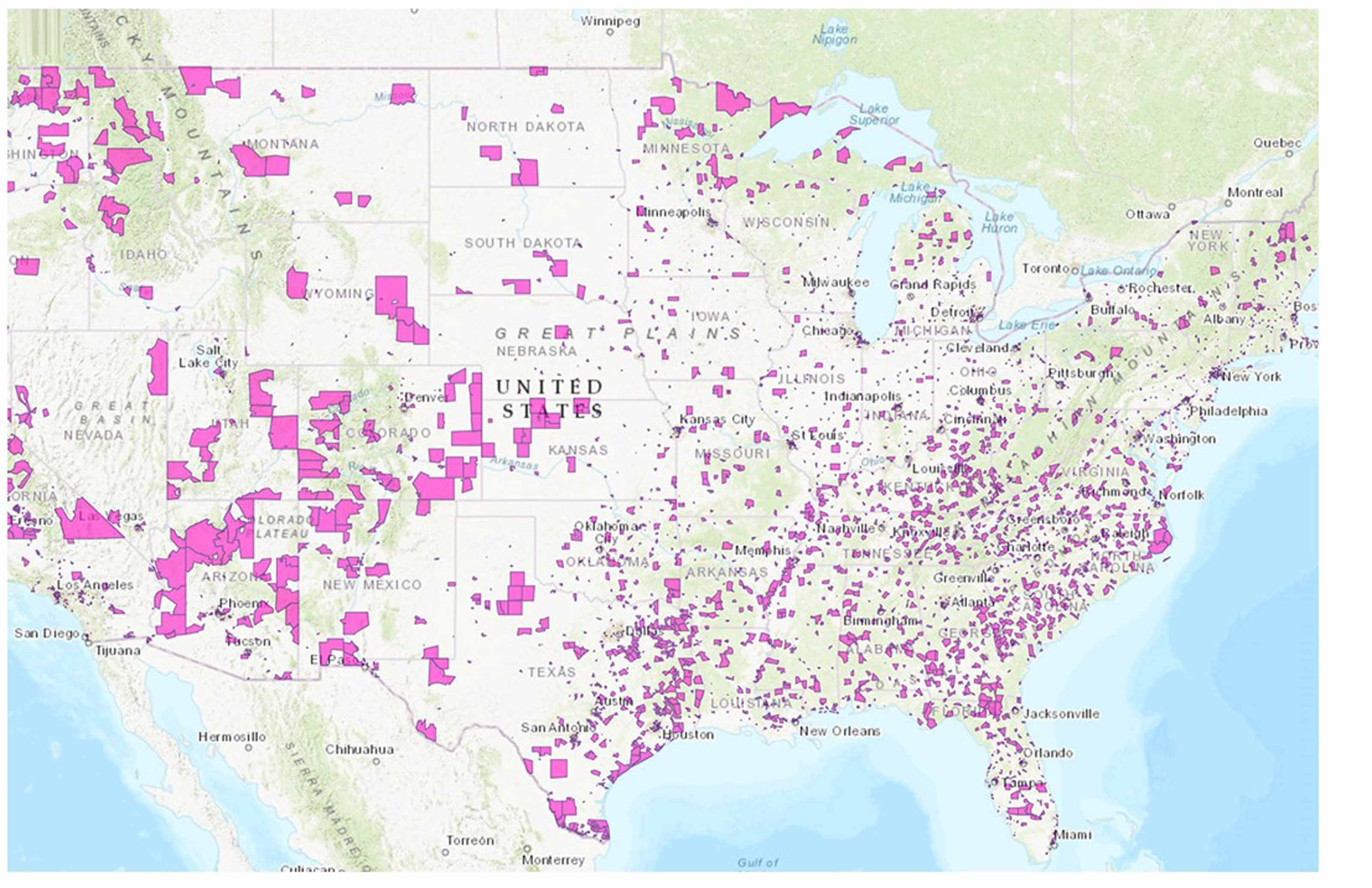Qualified Opportunity Zones vs. 1031 Exchanges
When it comes to real estate investing through qualified opportunity zones and 1031 exchanges, inquiring minds want to know which one is right for them.


Profit and prosper with the best of Kiplinger's advice on investing, taxes, retirement, personal finance and much more. Delivered daily. Enter your email in the box and click Sign Me Up.
You are now subscribed
Your newsletter sign-up was successful
Want to add more newsletters?

Delivered daily
Kiplinger Today
Profit and prosper with the best of Kiplinger's advice on investing, taxes, retirement, personal finance and much more delivered daily. Smart money moves start here.

Sent five days a week
Kiplinger A Step Ahead
Get practical help to make better financial decisions in your everyday life, from spending to savings on top deals.

Delivered daily
Kiplinger Closing Bell
Get today's biggest financial and investing headlines delivered to your inbox every day the U.S. stock market is open.

Sent twice a week
Kiplinger Adviser Intel
Financial pros across the country share best practices and fresh tactics to preserve and grow your wealth.

Delivered weekly
Kiplinger Tax Tips
Trim your federal and state tax bills with practical tax-planning and tax-cutting strategies.

Sent twice a week
Kiplinger Retirement Tips
Your twice-a-week guide to planning and enjoying a financially secure and richly rewarding retirement

Sent bimonthly.
Kiplinger Adviser Angle
Insights for advisers, wealth managers and other financial professionals.

Sent twice a week
Kiplinger Investing Weekly
Your twice-a-week roundup of promising stocks, funds, companies and industries you should consider, ones you should avoid, and why.

Sent weekly for six weeks
Kiplinger Invest for Retirement
Your step-by-step six-part series on how to invest for retirement, from devising a successful strategy to exactly which investments to choose.
Real estate investors have used the Section 1031 exchange for decades to trade assets while deferring taxable gains. On the other hand, the qualified opportunity zone program provides real estate investors options to defer taxes and, in some cases, even eliminate taxable profits altogether, which has led real estate investors to ask: Which is better, a 1031 tax exchange or a qualified opportunity zone real estate investment?
The IRS has established strict regulations for both alternatives, and some real estate investments may qualify for both tax breaks. Before choosing between the two approaches, real estate investors should understand how the differences affect their taxable gains.
What Is a Qualified Opportunity Zone?
Communities in economic distress needing investment and revitalization are known as “opportunity zones,” but many properties within these districts have undergone significant changes and are ripe for development. As a result of the Tax Cuts and Jobs Act of 2017, opportunity zones offer tax incentives for investing in community development in these areas to encourage economic growth and job creation.
From just $107.88 $24.99 for Kiplinger Personal Finance
Become a smarter, better informed investor. Subscribe from just $107.88 $24.99, plus get up to 4 Special Issues

Sign up for Kiplinger’s Free Newsletters
Profit and prosper with the best of expert advice on investing, taxes, retirement, personal finance and more - straight to your e-mail.
Profit and prosper with the best of expert advice - straight to your e-mail.
Opportunity zones range from rural areas without services, to blighted neighborhoods, to areas that have experienced economic redevelopment. The governors of each state nominate a small number of tracts that meet the criteria for official designation as qualified opportunity zones (QOZs). Opportunity zones are designated and certified by the Secretary of the U.S. Treasury Department, with approval from the IRS.
Over 8,000 qualified opportunity zones exist in the United States, accounting for 12% of all Census tracts. The Department of Housing and Urban Development's website provides an interactive map highlighting where the opportunity zones are located. Rural areas make up nearly 23% of them.

The federal government created qualified opportunity zones to encourage investment and economic development. This landmark legislation came with several tax benefits for individuals who invested through a qualified opportunity fund. Qualified opportunity funds (QOFs) are investment entities, like companies or partnerships, created to invest in property within opportunity zones.
Investments made by eligible opportunity funds must meet specific criteria. For example, real estate assets must be new or significantly renovated. It is prohibited to purchase existing real estate without making significant improvements. A substantial improvement to an opportunity zone property means that the opportunity fund investments must be equal to or greater than the value of the asset and must be completed within 30 months.
Benefits of a Qualified Opportunity Zone
Capital gains deferrals from prior investments are the primary tax benefit of opportunity zone programs. In particular, an investor who transfers capital gains from a prior investment into a QOF within 180 days of the sale date can defer taxation on the gain until December 31, 2026.
Opportunity zones can be a great solution for any capital gains, long or short term. The gains could be from the sale of real estate, sale of a closely held business, or from the sale of any kind of appreciated asset, including stocks, art, collections or other assets of value.
In addition, if qualified opportunity fund investors hold their investments for at least five years, they can further reduce their deferred capital gain because their cost basis will increase by 10% at that point (Note: under current tax law, an investment made after December 31, 2021, will be ineligible for the 10% basis step-up since deferred taxation on December 31, 2026, will occur prior to the five-year holding period being met). And those who can hold their QOF investments for 10 years or more can enjoy 100% tax-free gains. This gives investors a competitive advantage in wealth creation.
What Are 1031 Exchanges?
By participating in a 1031 exchange, investors can exchange one investment property for another while at the same time deferring the capital gains taxes that would otherwise be due at the time of sale. In this strategy, investors can substantially improve their properties without paying taxes on the profits.
If you want to dive more into 1031 exchange rules, check out my masterclass, Master The 1031 Exchange.
Benefits of a 1031 Exchange
Similar to qualified opportunity zones, the main benefit of a 1031 exchange is tax deferral. Once a property owner exchanges an investment property for another property of a “like kind,” they get to defer the taxes on their gains until the replacement property is sold. This tax deferral gives investors more funds available to increase their purchasing power through higher down payments and higher-priced replacement property purchases. In this way, investors can leverage their cash and grow their wealth.
In addition, 1031 exchanges are also very flexible as far as the property type is concerned. Investors can, for example, exchange one property for another, consolidate multiple properties into a single one, or exchange the existing property for several smaller ones.
Which Investment Do I Choose: QOZ or 1031 Exchange?
Although both QOZs and 1031 exchanges serve to defer capital gains taxes, there are significant differences between them. Accordingly, determining which program is preferable depends on the investor's goals and objectives.
For Tax Deferral, 1031 Exchanges Have the Edge
If the investor's primary goal is to stay in the real estate investing business for the rest of their life, the 1031 exchange is superior to QOZs. These investors do not want to cash out, or maybe they only want to cash out at a much later date (and they are prepared to pay capital gains taxes at that time if they do).
For Realizing Profits, QOZ Funds Have the Edge
If an investor intends to realize profits at some point during their lifetime, a QOZ might be a better option because QOZs separate the basis and the capital gain. On the other hand, if an investor wishes to keep their basis for other investments or opportunities, they may choose to invest only the capital gains. An investor who uses a 1031 exchange has a distinct disadvantage because, in order to have a complete deferral of taxes, they need to roll all the proceeds from the sale into the new investment.
As Estate Planning Tool, 1031 Exchanges Have the Edge
Because an investor can carry the tax deferral from a 1031 exchange forward indefinitely, 1031 exchanges can be useful estate planning tools. Deferred gains are eliminated upon passing. Suppose the investor holds onto the property for the rest of their lives. In that case, their heirs receive a step-up basis based on the property's fair market value at the time of passing, wiping out any earlier appreciation in value. In addition, capital gain taxes are not imposed on these heirs when the asset is sold.
However, any beneficiaries of a QOZ fund who inherit their interest before Dec. 31, 2026, will inherit the original tax basis in the investment because QOZs do not provide a step-up upon death. Thus, they will be liable for the taxes; however, if the successor continues to hold the QOZ fund interest for at least 10 years after the initial investment, their tax basis will be stepped-up to the fair market value of the investment upon disposition under the QOZ program.
Key Takeaways
- A qualified opportunity zone and a 1031 exchange give real estate investors tax advantages.
- A QOZ and a 1031 tax exchange require different strategies that investors need to understand before choosing which route to take.
- Investors in qualified opportunity zones benefit primarily from the deferral of capital gains from prior investments.
- The key benefit of a 1031 exchange is that investors can swap or consolidate investment properties while deferring capital gains taxes at the same time.
- When it comes to deferring taxes, 1031 exchange has the advantage.
- When it comes to profit realization, the advantage goes to qualified opportunity zones.
- If you compare QOZ and 1031 exchange in estate planning, the 1031 exchange has the advantage.
Investing in 1031 exchanges offers many benefits to investors, including significant tax advantages and the opportunity to grow and leverage their wealth with minimal financial obligations. However, to fully benefit from them, you must adhere to specific timeframes and rules.
It's important for an investor to always consider their long- and short-term goals as well as their income and equity objectives. 1031 exchanges and qualified opportunity zones both have their respective pros and cons. A knowledgeable planner and tax team can help an investor determine which strategy or combination of strategies can best serve an investor's needs.
Profit and prosper with the best of Kiplinger's advice on investing, taxes, retirement, personal finance and much more. Delivered daily. Enter your email in the box and click Sign Me Up.

Daniel Goodwin is a Kiplinger contributor on various financial planning topics and has also been featured in U.S. News and World Report, FOX 26 News, Business Management Daily and BankRate Inc. He is the author of the book "Live Smart - Retire Rich" and is the Masterclass Instructor of a 1031 DST Masterclass at www.Provident1031.com. Daniel regularly gives back to his community by serving as a mentor at the Sam Houston State University College of Business. He is the Chief Investment Strategist at Provident Wealth Advisors, a Registered Investment Advisory firm in The Woodlands, Texas. Daniel's professional licenses include Series 65, 6, 63 and 22. Daniel’s gift is making the complex simple and encouraging families to take actionable steps today to pursue their financial goals of tomorrow.
-
 Betting on Super Bowl 2026? New IRS Tax Changes Could Cost You
Betting on Super Bowl 2026? New IRS Tax Changes Could Cost YouTaxable Income When Super Bowl LX hype fades, some fans may be surprised to learn that sports betting tax rules have shifted.
-
 How Much It Costs to Host a Super Bowl Party in 2026
How Much It Costs to Host a Super Bowl Party in 2026Hosting a Super Bowl party in 2026 could cost you. Here's a breakdown of food, drink and entertainment costs — plus ways to save.
-
 3 Reasons to Use a 5-Year CD As You Approach Retirement
3 Reasons to Use a 5-Year CD As You Approach RetirementA five-year CD can help you reach other milestones as you approach retirement.
-
 The 4 Estate Planning Documents Every High-Net-Worth Family Needs (Not Just a Will)
The 4 Estate Planning Documents Every High-Net-Worth Family Needs (Not Just a Will)The key to successful estate planning for HNW families isn't just drafting these four documents, but ensuring they're current and immediately accessible.
-
 Love and Legacy: What Couples Rarely Talk About (But Should)
Love and Legacy: What Couples Rarely Talk About (But Should)Couples who talk openly about finances, including estate planning, are more likely to head into retirement joyfully. How can you get the conversation going?
-
 How to Get the Fair Value for Your Shares When You Are in the Minority Vote on a Sale of Substantially All Corporate Assets
How to Get the Fair Value for Your Shares When You Are in the Minority Vote on a Sale of Substantially All Corporate AssetsWhen a sale of substantially all corporate assets is approved by majority vote, shareholders on the losing side of the vote should understand their rights.
-
 How to Add a Pet Trust to Your Estate Plan: Don't Leave Your Best Friend to Chance
How to Add a Pet Trust to Your Estate Plan: Don't Leave Your Best Friend to ChanceAdding a pet trust to your estate plan can ensure your pets are properly looked after when you're no longer able to care for them. This is how to go about it.
-
 Want to Avoid Leaving Chaos in Your Wake? Don't Leave Behind an Outdated Estate Plan
Want to Avoid Leaving Chaos in Your Wake? Don't Leave Behind an Outdated Estate PlanAn outdated or incomplete estate plan could cause confusion for those handling your affairs at a difficult time. This guide highlights what to update and when.
-
 I'm a Financial Adviser: This Is Why I Became an Advocate for Fee-Only Financial Advice
I'm a Financial Adviser: This Is Why I Became an Advocate for Fee-Only Financial AdviceCan financial advisers who earn commissions on product sales give clients the best advice? For one professional, changing track was the clear choice.
-
 I Met With 100-Plus Advisers to Develop This Road Map for Adopting AI
I Met With 100-Plus Advisers to Develop This Road Map for Adopting AIFor financial advisers eager to embrace AI but unsure where to start, this road map will help you integrate the right tools and safeguards into your work.
-
 The Referral Revolution: How to Grow Your Business With Trust
The Referral Revolution: How to Grow Your Business With TrustYou can attract ideal clients by focusing on value and leveraging your current relationships to create a referral-based practice.